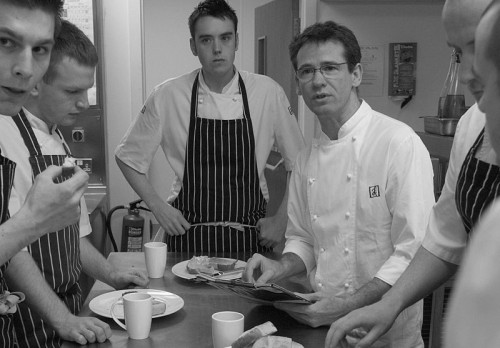SCOTLAND’s leading chef has called for a crackdown on scallop dredging, saying it threatens the environment and coastal communities.
In a move which has angered trawler fishermen, Andrew Fairlie, the only Scottish chef with two Michelin stars, has called for a ban on dredging in shallow inshore waters.
The £30-million-a-year industry involves trawlers dragging large rakes along the seabed, and 98% of the 20,000 tonnes of scallop landed annually are fished this way.

Critics, including TV chef Hugh Fearnley-Whittingstall, say this destroys the seabed as well as shellfish stocks.
Mr Fairlie runs a restaurant at Gleneagles named after himself, said he was hit by abuse on Twitter after he spoke out about the industry.
He said: “I don’t think you can ban dredging [altogether], although they have banned it in Norway where they have one of the healthiest fishing industries in the world.
“But I think inshore shallow dredging should be banned. It has to be managed properly and at the moment it’s a free for all.
“Some of the scallop divers I talk to have terrible problems with some of the [dredging] boats. They understand that the guys who work on trawlers are part of the community too but they [the dredgers] can’t continue to fish as they are because they are ruining the community.”
He said after he Tweeted about the issue he “got quite a lot of abuse from fishermen… I was accused of being elitist and trying to make scallops a rich man’s food”.
He said he would be willing to meet representatives from the industry to discuss the methods used.
“Stick to cooking”
Charles Millar, director of the Sustainable Inshor Fisheries Trust which represent divers who dive for the shellfish by hand, said scallop dredgers caused huge damage to seabeds.
He said: “They are the most significant cause of ecosystem degradation in our coastal seas. The heavy, iron teeth with rip through habitats and flatten the seabed, devastating the fish nurseries we need to restore stocks.”
But The Scallop Association, based in Elgin, said the chefs should “stick to cooking.”
Secretary John Hermse said: “Someone should tell these guys to stick to cooking.
“Fairlie is making comments without information. We have a long-standing commitment to no-take zones on rotation to help with stock sustainability and protection of areas and there are already seasonal closures in place.
“I think the Fish to Fork website [which promotes sustainable restaurants] now realises that a lot of the hyper-tension given to the scallops debate is over-egged, emotional dogma and drivel perpetrated by people like this who seem to want a world which is unaffected by anything.
“People like Fearnley-Whittingstall and Fairlie are making scallops an elitist item.”
The industry body, Seafish, warned a ban would threaten jobs in the induustry, which employs more than 1,000 people.
A spokeswoman added: “We believe Fearnley-Whittingstall has been a positive force for sustainability in fishing despite our recent difference of opinions. Indeed, an industry-wide body facilitated by Seafish has recently written to Hugh seeking a meeting and we welcome the suggestion of a similar meeting in Scotland put forward by Andrew.
“We hope that through this we can plot a path for the future together rather than apart and hope that will lead to some positive outcomes for everyone concerned.”

